Without warning, thresholds can open directly before our feet.
—John O’Donahue, To Bless the Space Between Us
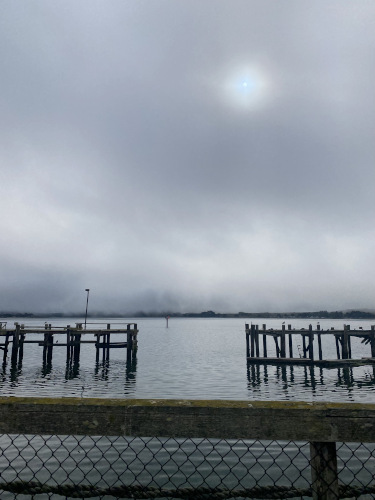
Even if we’re connected to family, if we feel disconnected from their land—a cutting-loose, like what was there for us is setting us free—it’s time to move on. It’s not home anymore.
If your lover lives in Hong Kong and cannot get to Chicago, it will be necessary for you to go to Hong Kong. Perhaps you will spend your life there, and never see Chicago again. And you will, I assure you, as long as space and time divide you from anyone you love, discover a great deal about shipping routes, airlines, earth quake, famine, disease, and war. And you will always know what time it is in Hong Kong, for you love someone who lives there. And love will simply have no choice but to go into battle with space and time and, furthermore, to win.
—James Baldwin, Nothing Personal
When we feel rejected, the love and the land might be protecting us from something we would have done. That was the case when I ignored a message from ravens once. We might not know why the redirection, but I trust it and anyway enjoy the wonder of the unexpected.
When we finally reach our true home, the place might have developed an emptiness or miasma in our absence: evidence of our effect when we’re present; confirmation that we belong. A hint of fall might cast a chill, with the Sun only just peeking through the trees; smoke from a prescribed burn might thicken the air; a neighbor’s dogs might jump in front of the eager car; a rattling sound might develop at one of the wheels; our bodies might groan at the slog to haul our luggage in; but when the ravens arrive, beside themselves with joy at seeing us, all is right with the world.
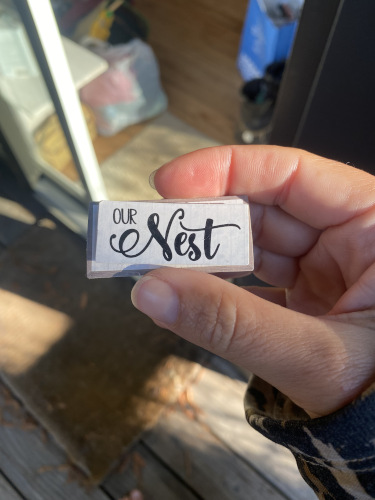
In a way, you’ve already won in this world, because you’re the only one who can be you.
—Mister Rogers
There’s nothing in the world like waking up in our own bed to the call of one or more of our favorite people, with a full day ahead in which to do whatever our spirits guide us—to give of ourselves however we’re moved to give.
. . . If you have something that’s working, make sure to go deep and build a foundation of strength before extending.
—Brian Lee in an interview with Jason Feifer: “Counterintuitive Wisdom from LegalZoom’s Founder”
I pay a visit to an old friend who tells me about a friend of his whose dream is simply to own a mobile home with knotty-pine interior. Naturally I share about my dream-cottage by the sea—and at that moment, a movie on his muted TV shows just that.
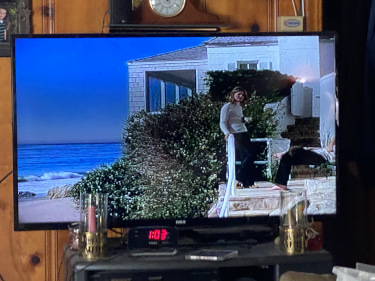
I give a sculptor friend a bunch of random stuff I had been trucking around to keep it out of the dump—raw materials for her work—and she and her guy give me a huge bag of fruit from their trees as well as a local-themed tanktop, which I am in fact now wearing as I write to you.
Though sometimes I hesitate about giving gifts for fear people will feel burdened by them or think there are hooks in them, it’s almost always worth the risk.
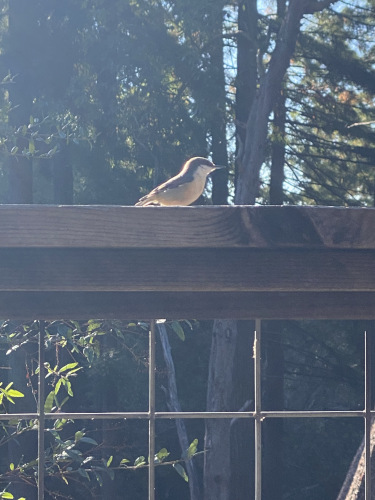
Love finds its way through the cracks somehow.
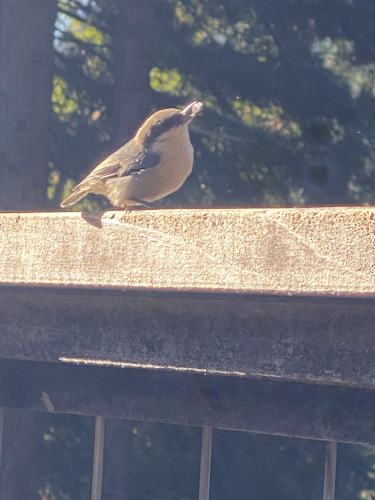
It feels good to do it, to cultivate generous qualities within myself, which is how I describe to nonspiritual people my various altars and shrines: even if my offerings do no other good, they cultivate sharing and gratitude within me, which enrich my life.
After I moved past the “not killing them” journey, I segued into the “saving them” journey, waking up in the morning and rescuing centipedes from the bathtub where they’d scuttled around for God knows how long, trying and failing to climb out after what I assume was a long night of partying around the wet drain. I’ve gotten really good at scooping them up and gently placing them on the floor so they can wriggle into a dark corner or escape under the bathroom sink, until of course, the next day or the day after, when I will inevitably do it all over again. I was telling a friend about my morning antics when I stopped to wonder if I would eventually build up enough trust and goodwill with the centipedes that they would consider me a friend and hero to their community. Would they recognize my face? Introduce me to their tiny, leggy children? . . . Some centipedes don’t even have eyes, and the ones who do have eyes have really poor eyesight. On top of that, they can barely hear anything, and solely rely on vibrations they can only partially feel. Unfortunately, they can’t tell which vibrations are their predators, so they often unknowingly bound toward something that will eat them. . . .
I’d be lying if I said I wasn’t inspired by the Gospel of the centipede. Yes, their lifespan is only 1–5 years, but to spend your entire little life chasing after what you feel because it could be something is a little noble. Maybe I’m just feeling sentimental because fall is coming and I won’t see any centipedes for a while.
—alyson, issue 34 of I Was High When I Wrote This
I achieve a breakthrough with mosquitoes, decades in the making—finally reaching a visceral understanding of how they not only are a vital part of the food cycle but are one way I can integrate with a (malaria-free) place. For the most part, as long as they stay within my sight and keep themselves to one or two at a time, I can willingly share my blood. At most I wave them off but rarely smack them—and when I do smack them, I feed them to spiders. If I allow them to drink their fill, the transfer sites seem to itch less than otherwise, too.
Learning to love them has been such a battle, but it’s even better not to have to fight them as much anymore.
. . . There are times in the human drama where one must wage an all-out fight. The problem is not fighting per se; it is an orientation toward fighting. It is a posture, a stance, a way of seeing that interprets, by default, all opposition to oneself or one’s nation, all violence, as an expression of evil. More fundamentally, it is a view . . . that the legal scholars Hanson and Yosifon call dispositionism—the idea that people do bad things because they are bad people, and good things because they are good people. The alternative, which they name situationism, says that people act from the totality of their circumstances. Put someone in a different environment, among different people, and they become a different person themselves. Clearly, the situationism invites more compassion than dispositionism, because one becomes curious about the conditions of the person he has judged.
—Charles Eisenstein, “More Naivete, Please”
I’m not yet to where I can tolerate mosquitoes sneaking up or coming in droves, but with an individual mosquito I can say, Here you go, love. Take what you need. What an experience, known by so few! I feel the Earth in it, too, loving all her creations, all her children. Giving freely. Plus, mosquitoes sated by me then spare others—and mosquitoes’ children feed other people I love, like birds and bats and fish.
Our gut is a teeming, tropical environment composed of up to 500 different bacterial strains, microbial romances and dramas playing out every time we eat a meal. Fungi weave between our eyelashes and festoon our skin. And our physical health is dependent on a constant conversation between these different beings. . . .
If we are nourished and constituted by tangled relationships with different species, why do our mythic and literary narratives prize heroic individuals and human-centric drama? Think of fairytales and myths you know well. The story is always linear. A knight kills the dragon and saves the maiden. A singular hero enters the dark wilderness, vanquishes beasts, and quests towards a neat conclusion. . . .
But in an age of ecological crisis, it is urgent that we reclaim the forgotten earth-reverent root system hidden below modern narratives . . . . For most of human history our stories were oral, carried in breath, sustained by constant retelling and revision. And they were mostly about animals and plants and weather systems. Older gods had horns and goddesses were often snakes. Stories weren’t linear, they were cyclical, teaching us how to live with seasonal fluctuations. Storytelling wasn’t concerned with human superiority. . . . It was about relationships. When we look back at the earliest cave paintings, we see running herds of horses and bison. Crowds of animals. Chevrons and patterns tracking storms and moon cycles. Maps of kinship. . . . Oral storytelling, tied to a concern for how to best live in a specific ecology, always requires a teller and a listener. It lives not in the singular author, but in the shared breath between audience and speaker.
. . . It is storytelling that rejects the idea of singular authorship. Rather, it acts as a messenger, carrying communications between members of the forest.
—Sophie Strand, “Ecological Storytelling”
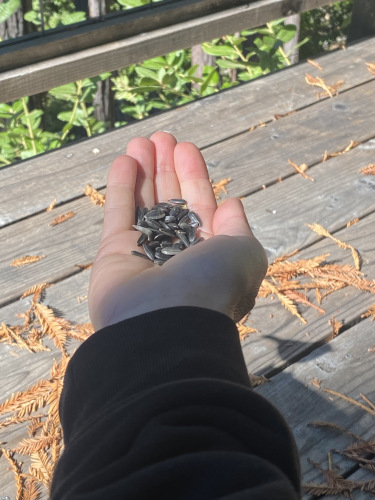
Sometimes chickadees seem to prefer sunflower seeds from my hand over ones from a little pile I make for them on the table.
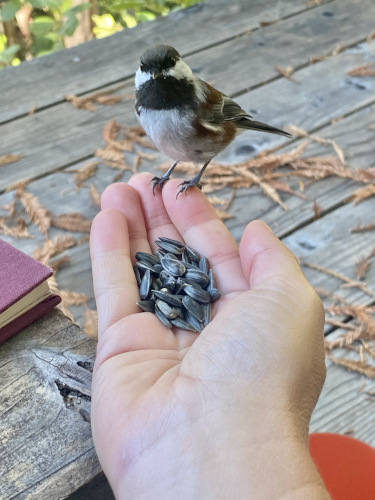
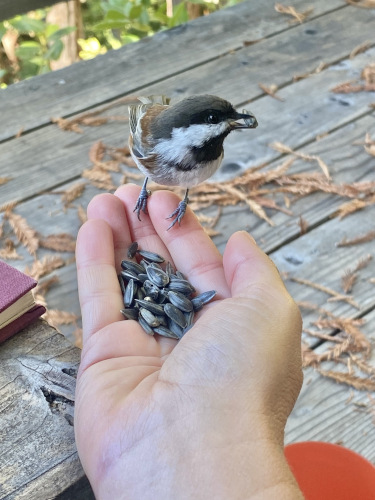
Seeds are planted and come abloom generations, centuries, civilizations later, migrating across coteries and countries and continents.
—Maria Popova, Figuring
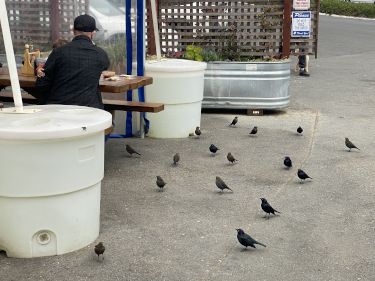
There is life’s work to be done.
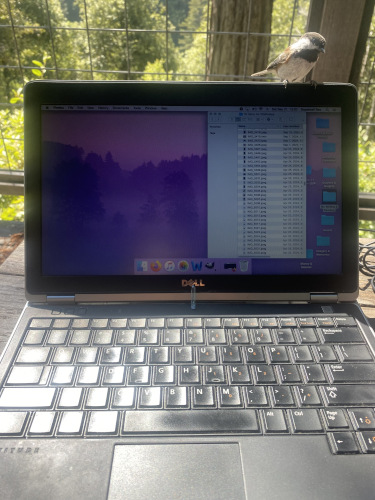
Forest disturbance whether it is caused by honey fungi or rutting deer or human beings often opens up or “aerates” densely wooded areas, letting smaller vegetation grow up again, providing a habitat for new mammals and birds. We are not a virus on this planet. We are necessary. But we have forgotten to “listen” for what that job might be.
It might be to pick up burrs on your pant leg on a walk, depositing them somewhere else to root down and then sprout. It might be to protect a certain swath of forest from development. Or it could “interrupt” our ideas of immediate productivity and result, merely being our role in placing our bare feet on soil, placing our bodies like acupuncture needles in a specific part of a landscape’s larger body.
. . . I think welcoming uncertainty to the table is key. Can we approach our mountains and fields and backyards with a receptive quietness, waiting to see if a bird flies across our path or a specific flower catches our attention? I like to say, what you love, loves you. What you notice is also noticing you. Is there a being quietly asking for your attention?
—Sophie Strand in an interview with Julia Edelman: “The Slow, Unglamorous Long-Game of Living Deeply”
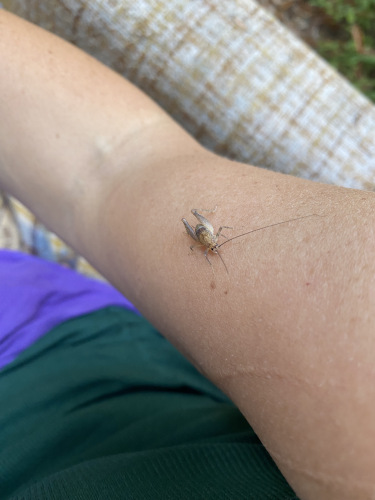
As I sit in Pa’s Chair, two crickets turn up, one after the other, one on each arm. Something, shy at present, is preparing to happen.
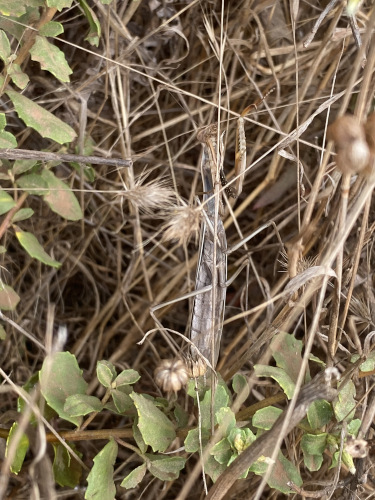
The time is very urgent—we must slow down.
—Bayo Akomolafe, “The Times Are Urgent: Let’s Slow Down”
On some level, we know that what has brought us this far must collapse. We’re edgy; we and our machines wail in pain or emptiness or grief.
But I do remember the feeling I had as I closed the book: I knew, I just knew in my bones, that Minamata wasn’t really very far away, and that poison—like horror—doesn’t observe boundaries: it never stays in the pot. Just as in fairy tales, the poison gets out, it spreads; there is always a story in its wake.
. . . Where my childhood gaze was locked on Tomoko, my adult gaze now registers the presence of Tomoko’s mother. She, too, is naked and vulnerable in the bath with her daughter. Her expression is loving, concerned, peaceful, almost expectant, as if waiting for Tomoko to say something. Her downcast eyes are fixed on her daughter’s upturned face. . . .
Seeing how horror can arrive unbidden on the doorstep of the innocent was the moment I lost my innocence. As a middle-aged woman, my gaze has shifted from the teenager to her mother. I’ve realised that is it she who holds the key. Maybe this is the most we can expect from an image of horror: that it asks us not to look away. It demands that we stay with it, and that we allow it to do its work within us . . . .
—Joanna Pocock, “The Risk of Beauty”
The redwoods are molting. We’re all changing: they, you, the ravens, and me.
Sometimes it is just so hard and the only way through is breath. I often times joke that anyone trying to practice mindfulness meditation should try living with chronic pain! It stitches you to the present moment like nothing else.
Things that do help are my friends, my family, my dog, and my deep and abiding sense that I am part of an evolutionary “long” story that far outstrips my human life. I am embraced by deep time. I am also embraced in the day to day of my meteor-streak life by my community.
—Sophie Strand in an interview with Julia Edelman: “The Slow, Unglamorous Long-Game of Living Deeply”
Sometimes when reading runes, I must deliver news of imminent difficulty.
. . . You will die, and I will die, and everyone we love will die, and what will survive of us are only shoreless seeds and stardust.
—Maria Popova, “The Light Between Us”
Knowing what’s coming, though, we can change course or prepare.
All love bridges the immense expanse between lonelinesses, becomes the telescope that brings another life closer and, in consequence, also magnifies the significance of their entire world.
—Maria Popova, “The Light Between Us”
I’m so used to fighting an uphill battle that—like Hiroo Onada, who kept fighting World War II for twenty-nine years after it ended—I’m at risk of continuing an ordeal when the fight is over. I’m loved and supported as I am, as evidenced by a beautiful place to live, a friend’s beautiful place at which to do my creative work while also giving him peace of mind, friends who nourish and are nourished by me, a job that’s hardly even work, good relationships with family, and deeply meaningful relationships with other-than-human people and worlds. Maybe I can set down my weapons, grief, and despair—or at least stop actively brandishing them. May everyone be as fortunate.
It Doesn’t Need to Be Hard at All!
—Dr. Laurie, “Ten of Wands”
The nozzle at the Upper Terrace has gone dry, so I swing my empty jug up the trail to the source-spring still trickling this late in the season. Perhaps it appreciates my regular offerings. For the long moment in which the water dribbles in, I sit in peace.
Living in a simple cabin in the Yukon wilderness brought me profound joy. . . . Challenges became satisfying, and each task meaningful. I found contentment in harmony with my surroundings, experiencing a deep-rooted, enduring happiness. The Yukon experience showed me that joy lies in simplicity—in quiet reflection, starry skies, and rustling leaves. It reinforced that stripping away the unnecessary often reveals the most profound and lasting joy.
—Gurdeep Pandher, “Joy Was Around You, but You Ignored It”
I lug the full container back down and, on a whim, check the shower. It works, which means the problem must be only in the line leading to the nozzle. I shed my traveling clothes and rinse off the road-dust, exfoliating deeply with a scrubby glove.
Just as I realized my connective tissue disease mapped directly onto my love of underground fungal connective systems, so could I understand my trauma to be less of a mortal wound, and more as a compass pointing out of anthropocentrism. What if the shape of your wounding, the exact flickering silhouette of your hypersensitivity, was the shape of a doorway into another being’s pain and experience?
—Sophie Strand, from a social media post in November 2021
Smoke from a prescribed burn has begun to clear. My throat is scratchy from it. Where did the jays go? They were just here. Sometimes they do this.
I go down for a rare nap and still feel strange afterward—metallic, almost dizzy, heavy, like my senses are pushing through a blanket of smoky fog. Is it the change of season? The change of me? The boil-water notice—which I’m disregarding as usual—at the friend’s place I look after?
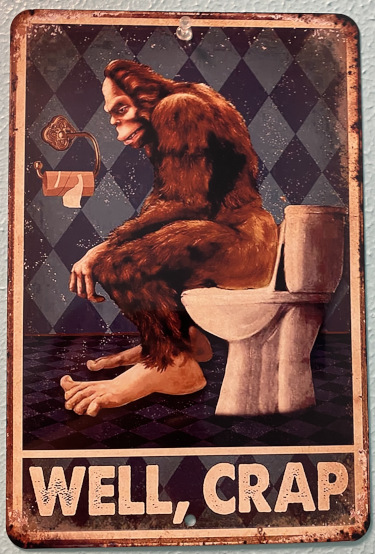
I feel moved to do something and forget what. That’s okay: no need to strain.
Sometimes, instead of getting on the good ol’ world wide web, I lay on the floor and stare at the ceiling. This is something that movie protagonists do when they have a crush on someone or are feeling existential, but you can actually do it any time. There’s no law against it. I prefer to lay down there when I’m in a good mood, because I can let my mind wander and trust that I won’t have to pull it out of any extreme depths . . . . When I’m down there, I put some music on and don’t get up until I feel like it.
—alyson, issue 34 of I Was High When I Wrote This
Doing long stretches of “nothing” is a revolutionary act.
Be an artist. Be a human. Be a healing person. Be a person with a small life when you need. You don’t need to be a product. . . . Success doesn’t need to mean you owe the world your entire self with no boundaries.
—Ren
I drift until I come aground.
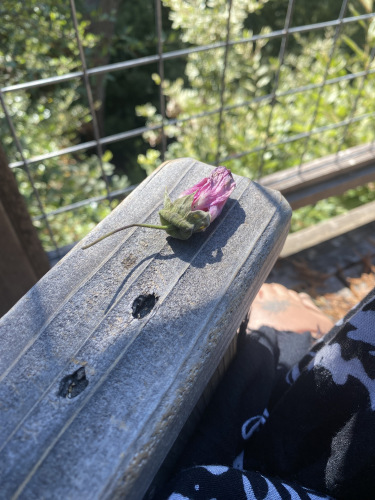
Death is not hidden from view here. It is not sanitized. And I may be a vegetarian but I find that refreshing and a good reminder to live life to the full. Death feeds life and informs everything we do. Death is sacred. Death should not be hidden from view, as that robs people of key experiences in life.
—Imelda Almqvist, “Back in Greenland (Kalaallit Nunaat!)”
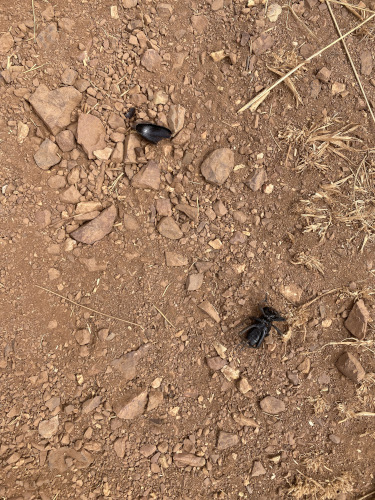
Here are the jays again:
Shy Mama’s quiet, watchful presence presides even when I can’t distinguish her from others who have charcoal-gray—rather than black—heads. One jay pauses for a long moment, peanut in beak, meeting my admiring gaze.
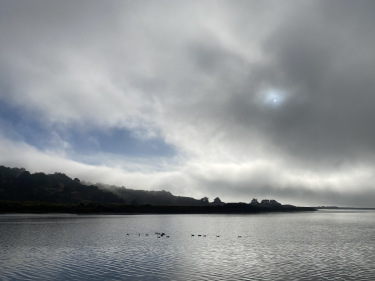
At dusk at the friend’s house, I call my parents, which is not something I would do at home at this time, because in the tent, my voice becomes amplified as the world around me quiets into evening. There’s a little more tenderness these days between my parents and me, more surrender or resignation when it comes to our differences. In some ways it’s sad, but it’s also a relief to let down my defenses a little.
After the call, my playlist on shuffle rouses me to dance for joy and for the jays and chickadees (who are quite curious) and everyone: one song after another after another.
The other day, there was a praying mantis of brightest green against the black railing of the entrance to the Longhouse. It was an amazing creature to behold as they always are. Saw it again perhaps an hour later, after which it disappeared.
—My friend Facet 44, in a text to me, shared with permission
It’s chillier now. Funny how quickly I go from wearing a tanktop and sarong to bed, to adding a hoodie, to beginning to consider socks and/or a scarf and/or fingerless gloves. I close the window to a crack.
As late dusk transitions to early night, I’m a confusion of opposites: peaceful and churning, lonely and content, soothed by crickets and agitated by vague unrest, electric and worn out, fearful and curiously hopeful, grieving and fulfilled. Crickets, the only sound, sing the warm heaviness of sleep up from behind my eyes. Whether it overtakes me soon or later, nothing pressing looms at the end of the night. I am free. The smoke has cleared, and I sink into blankets.
My nocturnal mind was different. Why did I feel both more fearful and more tranquil? Why was I more inclined to fret and fume? To behave with greater recklessness? Why did images, ideas, memories so often collide in a curious collage of colour and novelty? Writing problems I encountered during the day found solutions as I ambled round the darkened house, peering at the night sky from every passing window. In the middle of sleepless nights, my mind felt less logical, less methodical. . . . But in return, my inner critic fell silent. Ideas and thoughts meandered, melded and merged. I refused to pass judgment, but in the morning, when I looked afresh at whatever I’d written in the night, I often liked it.
. . . At night, it seems, the filter between us and the outside world is fractionally thinner and frailer.
—Annabel Abbs, “Spinning the Night Self”
Before I sleep, someone crunches by, through hillside leaves. Sounds like a deer.
Upon waking in the morning, I lose memory of whatever dreams had come, but a feeling of bright, peaceful adventure lingers. The morning is clear, with sunlight working its way down the opposite hill, and the Sun itself soon to peek out between the eastern trees.
